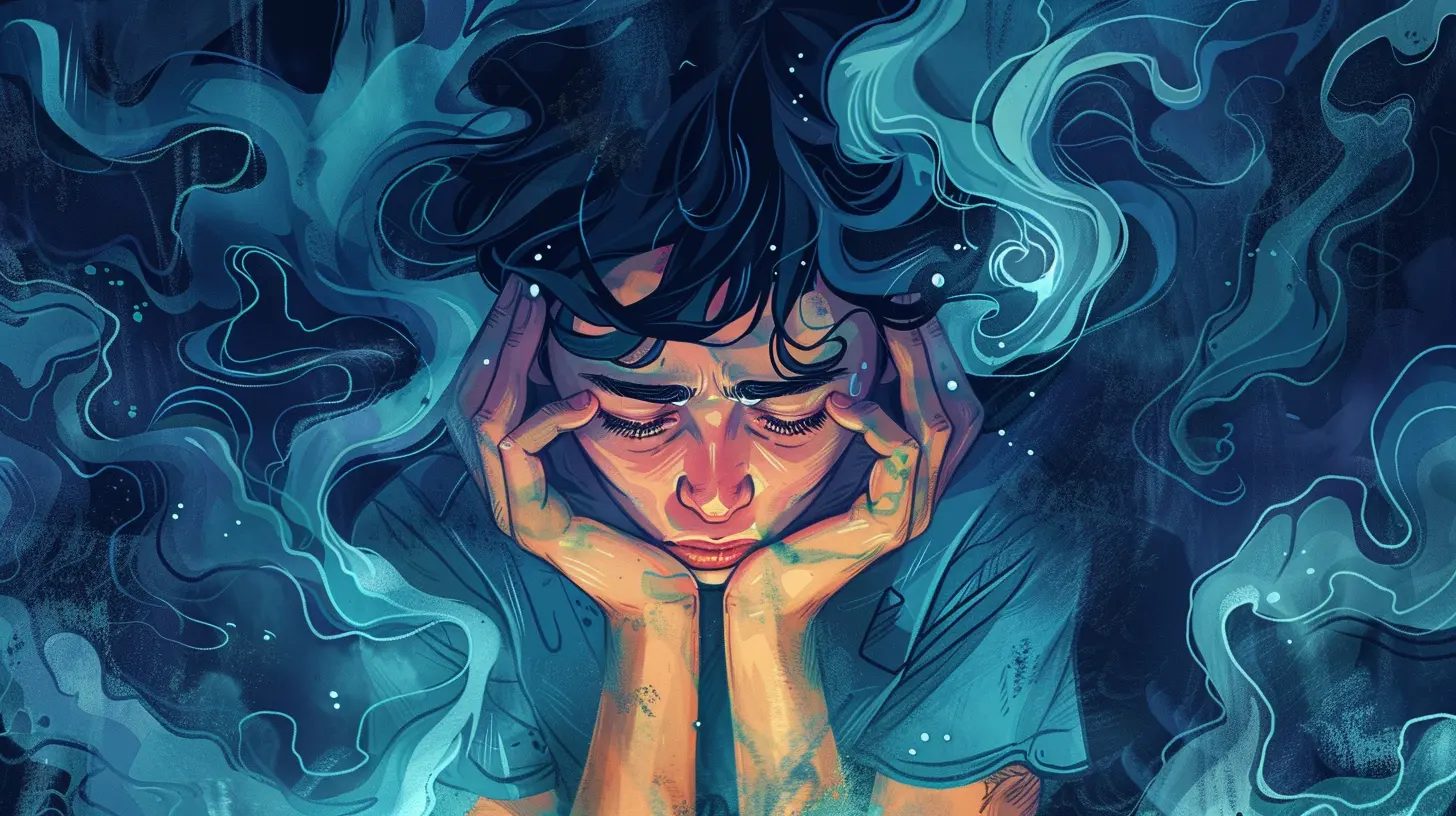Teen Anxiety: Signs, Causes, and How to Help
17 September 2025
Let’s be real for a second—being a teenager is tough. From juggling schoolwork and social pressures to navigating social media and figuring out who they are, teens have a lot on their plate. So, it’s no surprise that anxiety in teens is on the rise. But how can you tell if your teen is dealing with regular growing pains or something more serious, like anxiety? And more importantly, how can you help?
In this article, we’re diving deep into teen anxiety—what it looks like, what causes it, and what you, as a parent, can do to be their safe space. So grab a cup of coffee, sit back, and let’s talk it out.
🧠 What Is Teen Anxiety?
Before we get into the nitty-gritty, let’s clear one thing up—anxiety isn’t just about feeling nervous before a test or a big game. Everyone feels anxious sometimes, and that’s totally normal. But when worry becomes constant, overwhelming, and starts interfering with daily life? That’s when it crosses the line into an anxiety disorder.Anxiety in teens shows up differently than in adults. Teens may not even realize what they're feeling is anxiety. They might just say things like "I'm stressed," or "I don't feel good." As a parent, it's crucial to tune in and notice these shifts.
🔍 Common Signs of Anxiety in Teens
Anxiety doesn’t wear a name tag, so it can be tricky to identify. Here's what to keep an eye out for:1. Emotional Signs
- Excessive worry about school, the future, or relationships- Irritability or constant mood swings
- Feeling overwhelmed even by small tasks
- Avoiding social situations or withdrawing from friends
- Trouble concentrating or feeling "on edge"
2. Physical Signs
- Headaches or stomachaches with no medical cause- Sweating, trembling, or feeling lightheaded
- Fatigue or trouble sleeping (or sleeping too much)
- Rapid heartbeat or shortness of breath
3. Behavioral Changes
- Skipping school or activities they used to enjoy- Spending too much time alone
- Overuse of screens as a coping mechanism (hello, doom scrolling)
- Perfectionism or fear of making mistakes
Every teen is different, so the signs might vary. The key is noticing changes in behavior, especially if they last more than a few weeks.
🧨 What Causes Teen Anxiety?
There’s no one-size-fits-all answer here. Anxiety doesn’t just show up uninvited—it usually has a few triggers that pull up together like a carpool.1. Academic Pressure
The competition to get good grades, prepare for college, and meet expectations can be crushing. Some teens feel like their whole future depends on that one test—or that one GPA point.2. Social Media and Peer Pressure
Let’s face it, teens today live online. Whether it’s comparing themselves to carefully curated Instagram posts or dealing with cyberbullying, social media can be a minefield for mental health.3. Family Dynamics
Divorce, financial stress, parental conflicts, or even high expectations from parents can all contribute to a teen’s stress levels. Even if they don't say it, they feel it.4. World Events and News
Global issues like pandemics, climate change, and wars are just a tap away. Many teens are more tuned in than we think—and it can weigh heavily on their minds.5. Genetics and Brain Chemistry
Sometimes, it’s in the wiring. Teens with a family history of anxiety or other mental health conditions may be more prone to developing anxiety themselves.
📉 The Impact of Teen Anxiety
Unchecked anxiety can leave emotional bruises that last into adulthood. It can lead to:- Poor academic performance
- Isolation and loneliness
- Risky behaviors like substance abuse
- Depression and other mental health issues
But here’s the good news—anxiety is treatable, and early intervention makes a huge difference. You’re not powerless here.
💡 How to Help a Teen with Anxiety
Now to the part you’ve been waiting for—what can you actually do to help your teen?1. Open the Lines of Communication
Sounds simple, but this is the backbone of everything. Let your teen know they can talk to you—without judgment or lectures.Try asking open-ended questions like:
- “You’ve seemed a little off lately. Want to talk about it?”
- “Is there something at school or with friends that’s bugging you?”
And then, just listen. You don’t always need to fix it. Sometimes, just being heard is the fix.
2. Validate Their Feelings
Avoid saying things like “You’re overreacting” or “It’s not a big deal.” To them, it is a big deal. Instead, validate their emotions with phrases like:- “That sounds really tough. I’m here for you.”
- “I can see why that would make you anxious.”
By acknowledging their feelings, you build trust—and they’re more likely to come to you again.
3. Encourage Healthy Habits
Anxiety and lifestyle are BFFs—for better or worse. Help them learn how to manage anxiety by focusing on:- Regular sleep (yes, even on weekends)
- Nutritious meals (limit the junk and sugar highs)
- Daily exercise—even a walk counts
- Downtime away from screens and schoolwork
Think of these as the foundation of a calm mind.
4. Teach Coping Strategies
Equip them with tools to manage anxiety when it strikes. Try:- Deep breathing exercises (4 counts in, 4 counts out)
- Journaling or doodling their thoughts
- Positive affirmations (“I can handle this,” “This too shall pass”)
- Grounding techniques (like the 5-4-3-2-1 method)
Even better, try practicing some of these together. It shows them it's okay to take care of their mental health.
5. Limit Screen Time and Social Media
This one’s tricky, we know. Social media isn’t all bad, but too much scrolling can spike anxiety. Instead of banning it completely (which might backfire), encourage balance. Set tech-free zones and times, like during meals or an hour before bed.6. Be a Role Model
Your teen watches more than you think. Show them what managing stress looks like—whether it’s you taking deep breaths during traffic or talking openly about your own feelings.Being vulnerable with your teen doesn’t make you weak—it makes you real.
7. Seek Professional Help When Needed
Sometimes, love and support at home aren’t quite enough. And that’s okay.If anxiety is interfering with your teen’s daily life, it might be time to talk to a mental health professional. Therapists, school counselors, or pediatricians can all be a great starting point.
Cognitive behavioral therapy (CBT) is one of the most effective treatments for anxiety and can be incredibly helpful for teens. And in some cases, medication may be recommended in combination with therapy.
🥰 Final Thoughts: You’ve Got This
Parenting a teen with anxiety isn’t easy—it can feel like walking on eggshells. But the fact that you’re even reading this means you care deeply, and that’s half the battle won.Remember, you don’t need to have all the answers. You just need to show up, listen, and be on their team. Anxiety might be part of their journey, but with the right support, it doesn’t have to define it.
You're not alone in this. Your teen isn't either. And with a little patience, empathy, and action, things can—and do—get better.
all images in this post were generated using AI tools
Category:
Parenting TeenagersAuthor:

Liam Huffman
Discussion
rate this article
1 comments
Kristina McKinley
Navigating teen anxiety is like herding cats on roller skates—chaotic but crucial! Let’s uncover the signs, tackle the causes, and sprinkle a little love on this wild ride!
October 3, 2025 at 2:22 AM

Liam Huffman
Absolutely! Understanding and addressing teen anxiety can feel overwhelming, but with awareness and support, we can make a positive impact on their journey. Thank you for your engaging comment!


